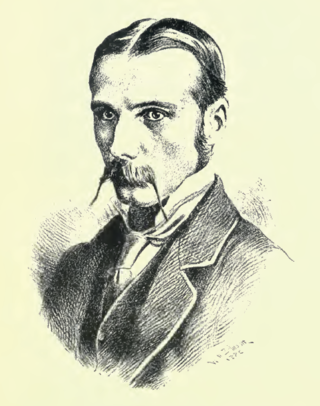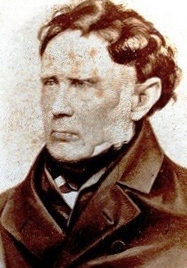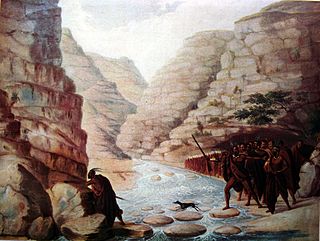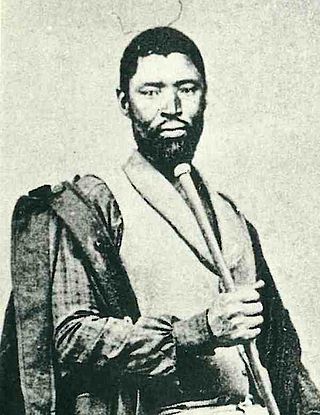
The history of the Cape Colony from 1806 to 1870 spans the period of the history of the Cape Colony during the Cape Frontier Wars, which lasted from 1779 to 1879. The wars were fought between the European colonists and the native Xhosa who, defending their land, fought against European rule.

Khoekhoe are the traditionally nomadic pastoralist indigenous population of South Africa. They are often grouped with the hunter-gatherer San peoples. The designation "Khoekhoe" is actually a kare or praise address, not an ethnic endonym, but it has been used in the literature as an ethnic term for Khoe-speaking peoples of Southern Africa, particularly pastoralist groups, such as the !Ora, !Gona, Nama, Xiri and ǂNūkhoe nations. The Khokhoe were once known as Hottentots, a term now considered offensive.

Sir Thomas UpingtonKCMG (1844–1898), born in Cork, Ireland, was an administrator and politician of the Cape Colony.

Griqualand West is an area of central South Africa with an area of 40,000 km2 that now forms part of the Northern Cape Province. It was inhabited by the Griqua people – a semi-nomadic, Afrikaans-speaking nation of mixed-race origin, who established several states outside the expanding frontier of the Cape Colony. It was also ancestral home to the Tswana and Khoisan peoples.

Sir Andries Stockenström, 1st Baronet, was lieutenant governor of British Kaffraria from 13 September 1836 to 9 August 1838.

The Xhosa Wars were a series of nine wars between the Xhosa Kingdom and the British Empire as well as Trekboers in what is now the Eastern Cape in South Africa. These events were the longest-running military action in the history of European colonialism in Africa.

Sir John Gordon Sprigg, was an English-born colonial administrator and politician who served as prime minister of the Cape Colony on four different occasions.

John Fairbairn was a newspaper proprietor, educator, financier and politician of the Cape Colony.

The South African Wars, including but also known as the Confederation Wars, were a series of wars that occurred in the southern portion of the African continent between 1879 and 1915. Ethnic, political, and social tensions between European colonial powers and indigenous Africans led to increasing hostilities, culminating in a series of wars and revolts, which had lasting repercussions on the entire region. A key factor behind the growth of these tensions was the pursuit of commerce and resources, both by countries and individuals, especially following the discoveries of diamonds in the region in 1867 and gold in 1862.
The Slachter's Nek Rebellion was an uprising by Boers in 1815 on the eastern border of the Cape Colony.

Mgolombane Sandile was a ruler of the Right Hand House of the Xhosa Kingdom. A dynamic leader, he led the Xhosa armies in several of the Xhosa-British Wars.

Justice Andries Stockenström, second son of Sir Andries Stockenström, was an influential judge in the Cape Colony. He was appointed Attorney-General of the Cape in 1877, but died soon after his appointment at the age of 36.
Field Commandant Christian Jacobus Groepe (1789–1886) was a military leader of the Khoi people of Kat River, Cape Colony, in the nineteenth century.

The Parliament of the Cape of Good Hope functioned as the legislature of the Cape Colony, from its founding in 1853, until the creation of the Union of South Africa in 1910, when it was dissolved and the Parliament of South Africa was established. It consisted of the House of Assembly and the legislative council.

Robert Godlonton (1794–1884) was an influential politician of the Cape Colony. He was an 1820 Settler, who developed the press of the Eastern Cape and led the Eastern Cape separatist movement as a representative in the Cape's Legislative Council.

Jongumsobomvu Maqoma was a Xhosa chief and a commander of the Xhosa forces during the Cape Frontier Wars. Born in the Right Hand House of the Xhosa Kingdom, he was the older brother of Chief Mgolombane Sandile and nephew to King Hintsa. In 1818, he commanded the forces of his father, Ngqika, who seemingly was trying to overthrow the government and become the king of the Xhosa nation. In 1822, he moved to the so-called neutral zone to take land but was expelled by the British troops. and Chief Maqoma his Know Usenam Ningi

Charles William Hutton MLC was a Member of the Cape Legislative Council and the country's Treasurer General during the Government of Prime Minister Thomas Scanlen.
Fredrick Stephanus Watermeyer, informally known simply as "Fred" or "Frank", was a journalist, advocate and a prominent Member of the Cape Legislative Assembly.

The Eastern Province Separatist League was a loose political movement of the 19th century Cape Colony. It fought not for independence, but for a separate colony in the eastern half of the Cape Colony independent from the Cape government, with a more restrictive political system and an expansionist policy eastwards against the remaining independent Xhosa states. It was crushed in the 1870s, and many of its members later moved to the new pro-imperialist, Rhodesian “progressive party”.

The Eighth Xhosa War was a war between the British Empire and Xhosa as well as Khoikhoi forces, between 1850 and 1853. It was the eighth of nine Xhosa Wars.

















